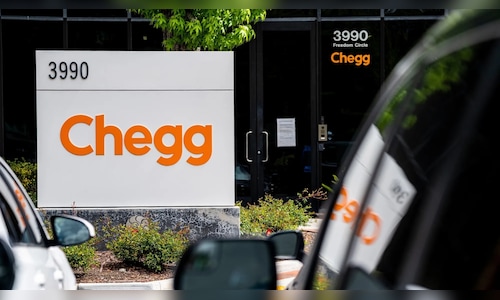“These two actions are connected, as we would not need to review strategic alternatives if Google hadn’t launched AI Overviews,” Chief Executive Officer Nathan Schultz said on Monday. “Traffic is being blocked from ever coming to Chegg because of Google’s AIO and their use of Chegg’s content to keep visitors on their own platform,” he added.
Chegg shares fell 18% in after-hours trading following the announcement, making it one of the worst performing stocks in the Russell 3000 Index. The stock has lost about 95% of its value since OpenAI first revealed its ChatGPT tool in 2022. Google didn’t immediately respond to a request for comment.
Google’s conduct “threatens to leave the public with an increasingly unrecognizable internet experience, in which users never leave Google’s walled garden and receive only synthetic, error-ridden answers in response to their queries — a once robust but now hollowed-out information ecosystem of little use and unworthy of trust,” Chegg said in its lawsuit. Website publishers have complained that Google’s dominance in search — which a federal court ruled last year is an illegal monopoly — is giving it an advantage in the ongoing AI wars, Bloomberg has reported.
Many publishers block the bots that AI companies use to “crawl,” or visit, millions of websites, gathering data that then helps train their commercial AI models. But most cannot afford to block Google’s main crawler, called Googlebot, which the tech giant uses not just to index sites so they can appear as results in Google search, but also to help it display the AI-powered summaries that are now shown at the top of Google’s search results page. Content creators have argued that these summaries obviate the need for people to visit their sites directly, costing them web traffic and users.
Santa Clara, California-based Chegg also posted a first-quarter sales outlook that missed consensus expectations. Schultz said Google’s AI Overviews had a “clear” impact on Chegg. “Our non-subscriber traffic plummeted to negative 49% in January 2025, down significantly from the modest 8% decline we reported in 2Q 2024,” he said.
Chegg filed its lawsuit in Washington DC, where a federal judge last year ruled that Google has illegally monopolized the online search market. The Justice Department has asked the court to impose a raft of conditions on Google to remedy the illegal conduct, including limits on its acquisitions related to AI and more fulsome opt-outs for websites from Google’s AI products. Judge Amit Mehta plans to hold a several-week hearing on the remedy proposal beginning in April.
The lawsuit by Chegg is the latest by smaller tech companies in the wake of last year’s landmark antitrust ruling against Google. Online review site- and longtime Google critic- Yelp Inc. also sued the search giant for alleged antitrust violations last year.


